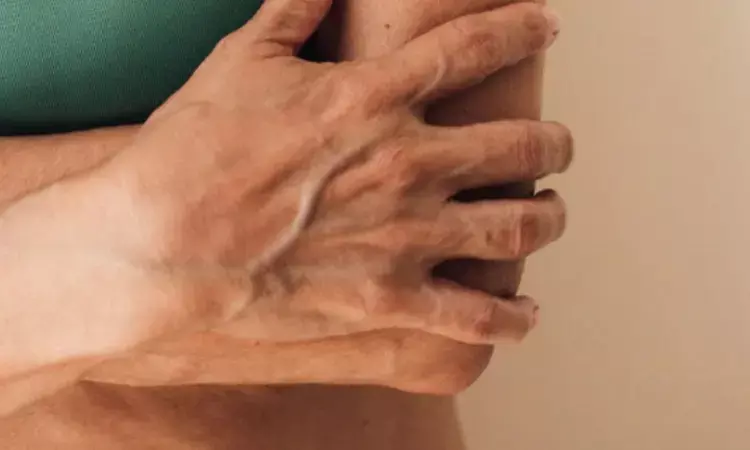- Home
- Medical news & Guidelines
- Anesthesiology
- Cardiology and CTVS
- Critical Care
- Dentistry
- Dermatology
- Diabetes and Endocrinology
- ENT
- Gastroenterology
- Medicine
- Nephrology
- Neurology
- Obstretics-Gynaecology
- Oncology
- Ophthalmology
- Orthopaedics
- Pediatrics-Neonatology
- Psychiatry
- Pulmonology
- Radiology
- Surgery
- Urology
- Laboratory Medicine
- Diet
- Nursing
- Paramedical
- Physiotherapy
- Health news
- Fact Check
- Bone Health Fact Check
- Brain Health Fact Check
- Cancer Related Fact Check
- Child Care Fact Check
- Dental and oral health fact check
- Diabetes and metabolic health fact check
- Diet and Nutrition Fact Check
- Eye and ENT Care Fact Check
- Fitness fact check
- Gut health fact check
- Heart health fact check
- Kidney health fact check
- Medical education fact check
- Men's health fact check
- Respiratory fact check
- Skin and hair care fact check
- Vaccine and Immunization fact check
- Women's health fact check
- AYUSH
- State News
- Andaman and Nicobar Islands
- Andhra Pradesh
- Arunachal Pradesh
- Assam
- Bihar
- Chandigarh
- Chattisgarh
- Dadra and Nagar Haveli
- Daman and Diu
- Delhi
- Goa
- Gujarat
- Haryana
- Himachal Pradesh
- Jammu & Kashmir
- Jharkhand
- Karnataka
- Kerala
- Ladakh
- Lakshadweep
- Madhya Pradesh
- Maharashtra
- Manipur
- Meghalaya
- Mizoram
- Nagaland
- Odisha
- Puducherry
- Punjab
- Rajasthan
- Sikkim
- Tamil Nadu
- Telangana
- Tripura
- Uttar Pradesh
- Uttrakhand
- West Bengal
- Medical Education
- Industry
Study Reveals Association of Muscle Disorders in Late Postmenopausal Women Linked to Menopause Type

Chile: As women transition through menopause, they often face many physiological changes, including alterations in muscle health. A new study published in the journal Menopause has shed light on the association between muscle disorders and the type of menopause experienced by late postmenopausal women. The findings underscore the importance of understanding menopause's impact on muscle health to better manage postmenopausal symptoms.
The study revealed that women with premature surgical menopause (PM) reported more musculoskeletal discomfort and sarcopenia than those with normal age of menopause (NAM). Physical activity and hormone therapy reduced sarcopenia risk.
Surgical menopause, often induced by bilateral oophorectomy, leads to an abrupt decline in estrogen levels, which plays a crucial role in maintaining muscle mass and strength. This hormonal imbalance can accelerate muscle loss and increase the risk of sarcopenia, a condition characterized by a progressive decline in muscle mass, strength, and function.
Juan E. Blümel, Universidad de Chile, Orquídeas, Santiago de Chile, Chile, and colleagues aimed to compare muscle disorders among women according to the type of experienced menopause: premature (PM) or normal age of menopause (NAM).
For this purpose, they conducted a cross-sectional study in nine Latin American countries in which late postmenopausal women (55 to 70 years) were surveyed with a general questionnaire, the Menopause Rating Scale (MRS: item #4 exploring musculoskeletal discomfort), and the strength, rising from a chair, assistance with walking, climbing stairs, and falling questionnaire (risk of sarcopenia).
644 women were included: 468 had NAM, and 176 had PM (116 spontaneous and 60 surgical). The overall mean age of the participants was 60.9 ± 4.2 years.
The study led to the following findings:
- Women who had PM experienced more musculoskeletal discomfort (33.5% vs 20.9%, P < 0.001) and a higher likelihood of sarcopenia (35.2% vs 19.9%, P < 0.001) than women who had a NAM.
- Women who had surgical PM exhibited a higher prevalence of severe musculoskeletal discomfort (46.7% vs 29.3%) and a higher likelihood of sarcopenia (45.0% vs 27.6%) than women who had a NAM.
- After adjusting for covariates (age, body mass index, physical activity, menopausal hormone therapy use, education, use of antidepressants, cigarette consumption, comorbidities, sexual activity, and having a partner), the logistic regression model determined that spontaneous PM was not associated with higher odds of musculoskeletal discomfort and higher odds of sarcopenia.
- Women who had surgical PM were more likely to experience musculoskeletal discomforts (odds ratio: 2.26) and higher odds for sarcopenia (odds ratio: 2.05) as compared to women who experienced a NAM.
In conclusion, the study showed a higher likelihood of muscle disorders in women experiencing surgical PM. The findings underscore the potential significance of hormonal levels in impacting musculoskeletal health during postmenopause.
Reference:
Vallejo, María S. MD1; Blümel, Juan E. MD, PhD2; Chedraui, Peter MD, PhD3,4; Tserotas, Konstantinos MD5; Salinas, Carlos MD6; Rodrigues, Marcio A. MD7; Rodríguez, Doris A. MD8; Rey, Claudia MD9; Ojeda, Eliana MD10; Ñañez, Mónica MD11; Monterrosa-Castro, Álvaro MD12; Gómez-Tabares, Gustavo MD13; Espinoza, María T. MD14; Escalante, Carlos MD15; Elizalde, Alejandra MD16; Dextre, Maribel MD17; Calle, Andrés MD18; Aedo, Sócrates MSc19. Association of muscle disorders in late postmenopausal women according to the type of experienced menopause. Menopause ():10.1097/GME.0000000000002367, April 30, 2024. | DOI: 10.1097/GME.0000000000002367
Dr Kamal Kant Kohli-MBBS, DTCD- a chest specialist with more than 30 years of practice and a flair for writing clinical articles, Dr Kamal Kant Kohli joined Medical Dialogues as a Chief Editor of Medical News. Besides writing articles, as an editor, he proofreads and verifies all the medical content published on Medical Dialogues including those coming from journals, studies,medical conferences,guidelines etc. Email: drkohli@medicaldialogues.in. Contact no. 011-43720751


